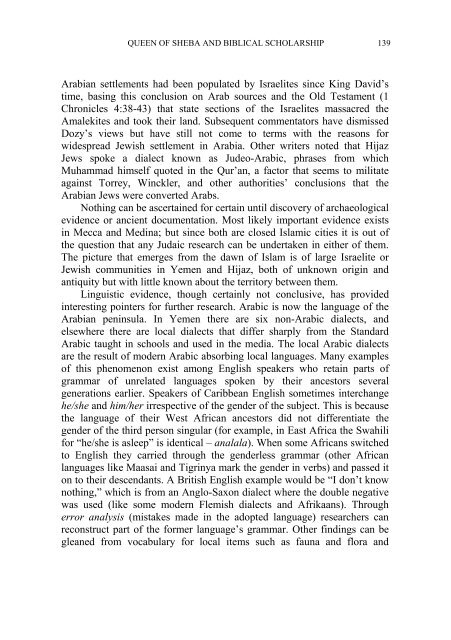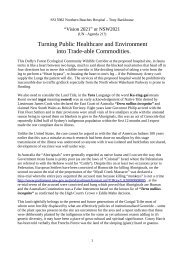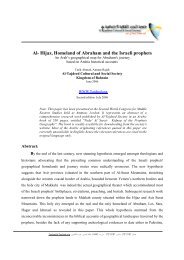Sheba
Sheba
Sheba
Create successful ePaper yourself
Turn your PDF publications into a flip-book with our unique Google optimized e-Paper software.
QUEEN OF SHEBA AND BIBLICAL SCHOLARSHIP 139<br />
Arabian settlements had been populated by Israelites since King David’s<br />
time, basing this conclusion on Arab sources and the Old Testament (1<br />
Chronicles 4:38-43) that state sections of the Israelites massacred the<br />
Amalekites and took their land. Subsequent commentators have dismissed<br />
Dozy’s views but have still not come to terms with the reasons for<br />
widespread Jewish settlement in Arabia. Other writers noted that Hijaz<br />
Jews spoke a dialect known as Judeo-Arabic, phrases from which<br />
Muhammad himself quoted in the Qur’an, a factor that seems to militate<br />
against Torrey, Winckler, and other authorities’ conclusions that the<br />
Arabian Jews were converted Arabs.<br />
Nothing can be ascertained for certain until discovery of archaeological<br />
evidence or ancient documentation. Most likely important evidence exists<br />
in Mecca and Medina; but since both are closed Islamic cities it is out of<br />
the question that any Judaic research can be undertaken in either of them.<br />
The picture that emerges from the dawn of Islam is of large Israelite or<br />
Jewish communities in Yemen and Hijaz, both of unknown origin and<br />
antiquity but with little known about the territory between them.<br />
Linguistic evidence, though certainly not conclusive, has provided<br />
interesting pointers for further research. Arabic is now the language of the<br />
Arabian peninsula. In Yemen there are six non-Arabic dialects, and<br />
elsewhere there are local dialects that differ sharply from the Standard<br />
Arabic taught in schools and used in the media. The local Arabic dialects<br />
are the result of modern Arabic absorbing local languages. Many examples<br />
of this phenomenon exist among English speakers who retain parts of<br />
grammar of unrelated languages spoken by their ancestors several<br />
generations earlier. Speakers of Caribbean English sometimes interchange<br />
he/she and him/her irrespective of the gender of the subject. This is because<br />
the language of their West African ancestors did not differentiate the<br />
gender of the third person singular (for example, in East Africa the Swahili<br />
for “he/she is asleep” is identical – analala). When some Africans switched<br />
to English they carried through the genderless grammar (other African<br />
languages like Maasai and Tigrinya mark the gender in verbs) and passed it<br />
on to their descendants. A British English example would be “I don’t know<br />
nothing,” which is from an Anglo-Saxon dialect where the double negative<br />
was used (like some modern Flemish dialects and Afrikaans). Through<br />
error analysis (mistakes made in the adopted language) researchers can<br />
reconstruct part of the former language’s grammar. Other findings can be<br />
gleaned from vocabulary for local items such as fauna and flora and




